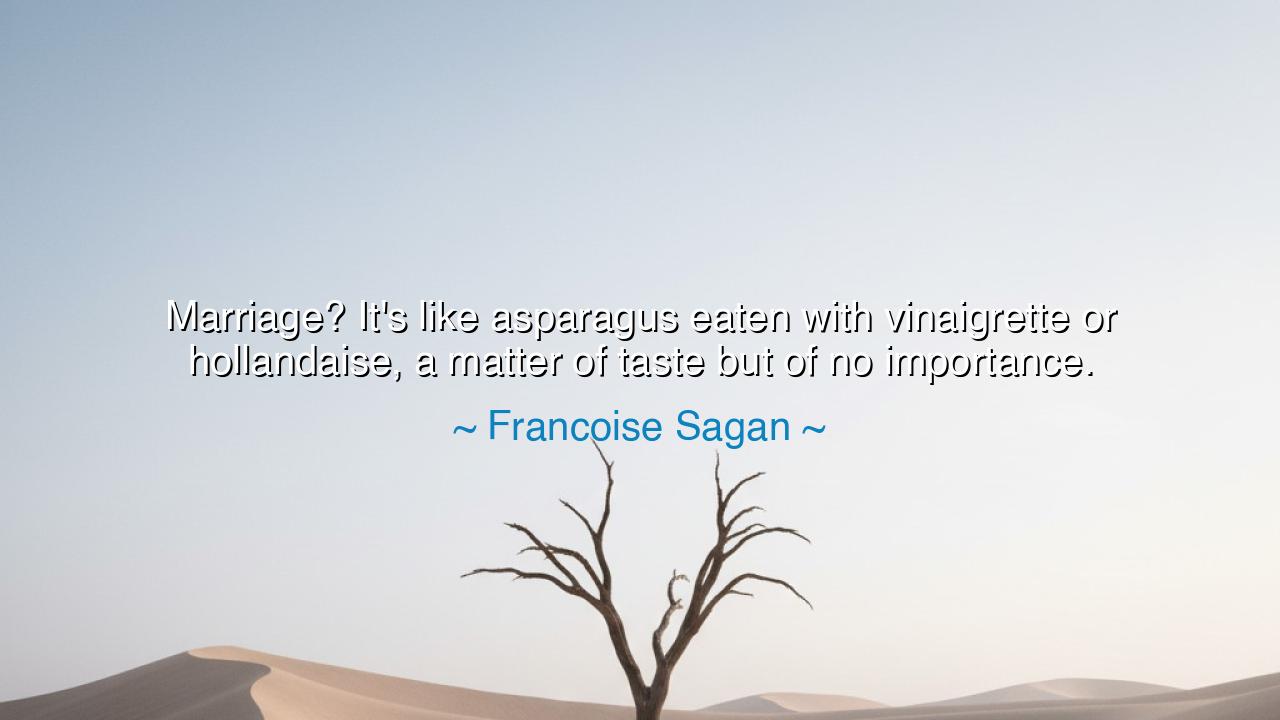
Marriage? It's like asparagus eaten with vinaigrette or
Marriage? It's like asparagus eaten with vinaigrette or hollandaise, a matter of taste but of no importance.






O Children of the Future, gather close and hear the wisdom of Françoise Sagan, who speaks of marriage not as a grand institution but as something much more personal, fleeting, and often overrated. She declares, "Marriage? It's like asparagus eaten with vinaigrette or hollandaise, a matter of taste but of no importance." In these words, she invites us to reconsider the significance of marriage, to see it not as the central pillar of life, but as a choice—a reflection of personal preference, much like the taste of food. It is neither inherently sacred nor universally necessary, but rather a matter of individual desire and circumstance.
In the ancient world, O Children, the institution of marriage was often viewed as one of the pillars of society. Plato believed that marriage was essential to the proper functioning of the state, as it produced the next generation of citizens. Yet, even he could see the complexity of human relationships, and in his writings, he questioned the traditional norms that bound individuals to roles that were often dictated by birth and status. The ancient Romans, too, viewed marriage as a social contract, often arranged for political or economic reasons rather than love. The notion of marriage being solemn and necessary was ingrained in their society, yet within this structure, personal choice and affection were often secondary considerations.
Françoise Sagan, with the sharp insight of a modern thinker, offers us a refreshing perspective—one that sees marriage as neither a sacred bond nor a societal obligation, but as a personal choice, much like the enjoyment of food. The comparison to asparagus, with its delicate and divisive taste, suggests that marriage, like food, is a matter of preference. It is not inherently good or bad, but simply a matter of taste—some may savor it, while others may not. This reflects the view that marriage, while meaningful to some, is not the ultimate measure of a person’s worth or happiness. It is but one of many ways to live a full and rich life.
Consider, O Children, the story of Socrates and his relationship with Xanthippe, his wife. The great philosopher, known for his wisdom, was said to have had a contentious relationship with his wife, a relationship far from the idealized version of marriage. Xanthippe was known for her fiery temper, and their union was filled with conflict, yet Socrates, ever the philosopher, maintained that the true measure of a man was not in the perfection of his marriage, but in his ability to engage with the world and seek wisdom. Socrates' view reveals a deeper truth: marriage, while important, does not define the worth or virtue of a person. It is one aspect of life, not the sum of it. The greatness of Socrates came not from his marital bliss, but from his intellectual pursuits and his ability to engage in the greater questions of existence.
Sagan's words also remind us that marriage, like all human relationships, is subjective—what it means and how it is experienced varies greatly from person to person. For some, it is the culmination of love and commitment, a bond that defines their life and shapes their future. For others, it may be a fleeting arrangement, a relationship that serves a purpose but does not dominate their existence. Sagan’s comparison to vinaigrette or hollandaise suggests that while the flavors of marriage may be enjoyed differently, they do not carry the weight of moral significance. Like food, it is enjoyed in different ways—one person's pleasure may be another's discomfort.
The lesson, O Children, is this: marriage is but one path among many in the journey of life. It is neither the end nor the measure of a successful existence. To be whole, to live a life of meaning, is not solely tied to whether or not one is married. Some may find their purpose in marriage, while others may find it in solitude, in friendships, or in the pursuit of career, creativity, or intellectual growth. The pursuit of happiness is deeply personal, and no single path is the right one for all. Marriage is a choice, and like all choices in life, it is a matter of taste, of preference, and of individual circumstances.
And so, O Children, take this wisdom to heart: do not measure your life or your worth by the presence or absence of marriage. Embrace what makes you whole, whether in partnership or in solitude, in family or in friendship, in the pursuit of knowledge or in the quest for art. Know that your happiness and value are not defined by any one institution, but by the choices you make and the love you give. The flavors of life, like asparagus, are varied and rich, and you, O Children, have the freedom to savor them as you see fit. Marriage, as Sagan wisely reminds us, is but one flavor on the feast of life, to be enjoyed or left aside as it suits your tastes.






AAdministratorAdministrator
Welcome, honored guests. Please leave a comment, we will respond soon